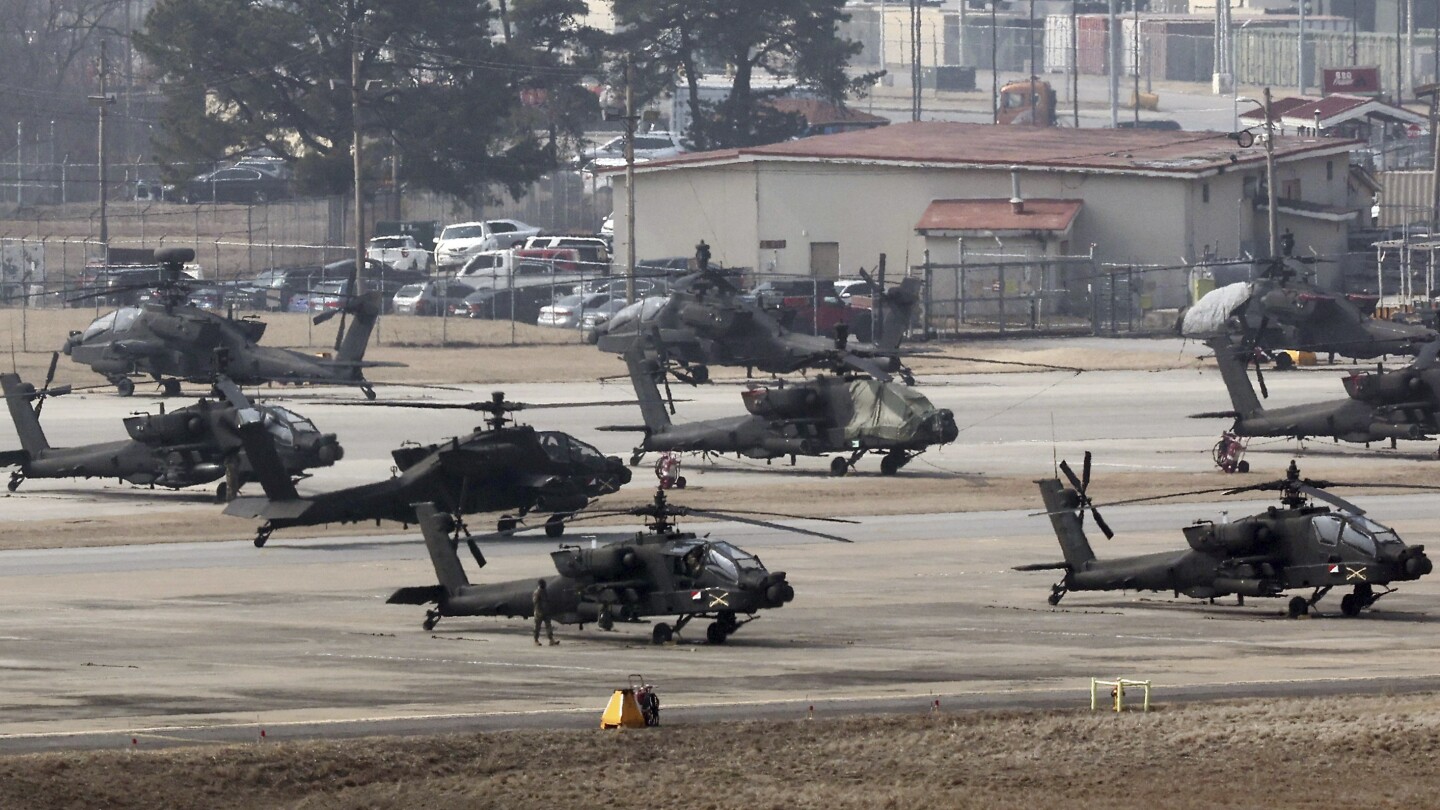Since the article conveniently doesn't mention it, military "exercises" includes activities such as flying a squadron of supersonic jets to the border before veering off at the last second, giving North Korea minutes to respond.
It's an invasion simulation that is virtually impossible to distinguish from a real invasion until it's over.
Im pretty sure this is normal procedure, this is just fearmongering. The quislings have been doing these invasion drills for decades.
Sounds like North Korea is starting to get fed up with their bullshit now.
Lol im pretty sure ive seen this exact article several times in my life, its like they recycle it to mantain the north korea narrative.
But the previous times were before the DPRK announced that they no longer think peaceful reunification is impossible. The other times were also before the US was actively crumbling and looking for another war to start to prop up the military industrial complex for another 6-12 months.
EDIT: though yeah, the article itself is baseless fearmongering.
Pop off North Korea. give the US another front to worry about.
Isn't an increased military arsenal exactly what the US wants North Korea to do? The entire strategy seemed to be forcing Korea to starve themselves by investing increasing larger amounts in the armed forces to the detriment of the country.
Wouldn't a focus on nuclear weapons and a divestment from such a large military help North Korea more? What's the US going to do then? I doubt they'd be to keen on turning Japan, Guam, Hawaii, and potentially the West Coast into an irradiated wasteland.
Nuclear weapons are not a panacea. They do not replace a conventional deterrent. If all you have are nuclear weapons and nothing else then your enemy has escalation dominance and can keep pushing your red lines bit by bit. Think about it, are you going to respond with an all out nuclear attack to every provocation? Or are you going to let the enemy employ salami slicing tactics until they are in a position to take out your nuclear deterrent and leave you with nothing?
Moreover, a country with nuclear weapons but a weak or nonexistent conventional military is effectively inviting a first strike on its nuclear capabilities because if those get neutralized the enemy then knows nothing can stop them. We know that the US' leaders are increasingly irrational and delusional. What if they decide you don't have the guts to actually pull the trigger on nuclear retaliation for a limited incursion or bombing campaign? What if they think they can take your nukes out before you launch, or they convince themselves that your weapons don't work or that they can defend against them?
Another issue is that simply having nuclear weapons is not enough, you also need to be able to deliver them on target, and in sufficient quantities to make the enemy pay more than what they consider an acceptable cost for destroying you. The DPRK don't have nuclear submarines and they won't ever gain the aerial superiority required to deliver nuclear payload by bombers so they are left with only one leg of the nuclear triad which is ground launched missiles. And those can be intercepted, especially if the distance is long as it is to the US mainland and the enemy has a large military presence in between, which the US does with its navy and its many bases in the Pacific. And the DPRK don't yet, as far as we know, have the hypersonic technology that Russia has which would make interception much harder. They also likely don't have thousands of nuclear missiles so they can't just rely on sheer numbers and betting that enough will get through to cause significant enough damage.
It would be one thing if they were only facing the puppet regime in occupied Korea, they can more than likely level all their cities as the distances there are too short to intercept, but their real enemy is an ocean away, with a large territory and forces spread out all over the globe. The only real way to guarantee your safety is for the US to be aware that you have the capabilities to fend off at least partially any first strike attempt (i.e. you have a good integrated air defense), AND that even if nukes are never launched you can make any potential conventional war very unpleasant and costly for them.
Admittedly this is a big cost to pay for a small country like the DPRK, but unless you have a bigger country to protect you it's either that or inviting destruction.
You quite literally answer almost all of your statements in your last paragraph. Do you think China would allow the US to toe Korea’s red line? Would relying on the PLA for the conventional deterrent not be the better strategy?
Also I didn’t say that Korea should demilitarize, I’m just saying that isn’t the army big enough? How many more howitzers, tanks, and planes can really help? Korea has more then enough to prevent line toeing, and do they really need more military investment?
But at what point is it way to much, paranoid, and actively detrimental to the lives of Koreans? If China somehow collapses, there aren’t enough T-72’s in the world to save Korea from the US.
But by the looks of it, China is going strong and shows no signs of stopping anytime soon.
Honestly I don't believe China would just let the DPRK get invaded like that, they certainly helped them last time, and they actually were outgunned too.
China would absolutely step in.
Even in a selfish and self serving view of the situation, having a U.S. presence along the current northern North Korean border would be a security disaster of catastrophic proportions. The US would be able to station land based troops a stones throw away from Beijing itself and threaten cutting off the entirety of Manchuria in the event of a conflict. Further, the US could solidify an unshakable grasp on the Yellow Sea with land based aircraft, and safe harbors along the coast.
In a more nuanced look, China would never let North Korea fall for the massive historical and cultural tie between the nations.
China would absolutely step in
Would they though? Can you guarantee that? Would you take that gamble if your survival depended on it? Both Russia and China have shown that they can be remarkably timid in situations where direct confrontation and conflict with the West would be required, much more timid in fact than NATO would be in the same situation.
Yes, they would.
Are you implying that China would rather let North Korea fall then become involved? Is that really a realistic scenario?
Do you think China will be timid if the US can station land troops, missiles, and ships 100km away from Beijing?
I'm just saying i don't know what would happen in that scenario and i think it's best to be cautious and not exclude any possibility.
Do you think China would allow the US to toe Korea’s red line? Would relying on the PLA for the conventional deterrent not be the better strategy?
Honestly i don't know, and i think neither do the Koreans. This isn't the 1950s and 60s anymore. I am not sure that anyone would intervene directly if the DPRK was attacked. They may give them weapons and send "advisors" like NATO is doing with Ukraine (and even then i think there is a chance that neither Russia nor China will do as much for the DPRK as NATO are doing for Ukraine), but the ones who will mainly have to do the fighting are the Koreans themselves.
You have to put yourself in their shoes: They lost their main ally once before when the USSR collapsed and that left them in a very bad position, they have learned that they can only really rely on themselves. Unless there is an explicit treaty with the PRC that guarantees that China will defend the DPRK, which i don't see China signing any time soon as they openly state they are opposed to the formation of blocs, the DPRK has to do whatever it deems necessary to ensure its own survival.
And as the Ukraine conflict has shown you can never have too much war materiel. In a large scale conflict you burn through an immense amount of munitions and equipment. So the larger your stockpile and your military industrial capabilities the better. How much exactly they should invest in military vs civilian economy that is up to the DPRK leaders to decide, we shouldn't presume that we know better than they do what the material conditions of the DPRK allow and call for. These are hard decisions that i don't envy them having to make.
That is not true at all. Missiles are intercepted at their terminal peak or in high altitude transit but anti-ballistic missiles. It just isn’t possible to intercept during launch unless the interceptor is somehow launched before the nuke.
Further, is Korea fires the nukes over the pole to hit the US, or East towards Japan, there is nothing Korea can do to help.
Indeed, and this is exactly what i was hinting at. There is a reason why the US insists on building bases so close to their adversaries, and why in turn this poses such a large threat to those same adversaries.
If you get your missile interceptors or even just your radars stationed close enough to the enemy borders you may be able to negate their nuclear deterrent, which is an existential threat for a nation that relies on nuclear deterrence because then mutual destruction is no longer assured.
Moreover this massively increases the risk of nuclear conflict because then the country that has managed to negate its principal opponent's nuclear arsenal is incentivized to launch a nuclear first strike asap as they may not have this same window of opportunity later. Luckily the US can't do this to Russia no matter what because Russia still has nuclear submarines.
I doubt they’d be to keen on turning Japan, Guam, Hawaii, and potentially the West Coast into an irradiated wasteland.
Why not? They didn't mind turning Ukraine into irradiated (thanks to depleted uranium) wasteland (thanks to everything else)
Ukrainians are acceptable losses. Korea being able to irradiate the mainland US, and it’s Pacific holdings are unacceptable.
The loss of Japan is also unacceptable. The US would lose its only primary ally in the region and only dragon ground. South Korea would be cut off, Taiwan would be encircled, and the US would have to rely on India, Australia, Vietnam, or the Philippines as a primary ally which would be an immense step down.
They’ve had approachable relations with the US for a while now. If the US pushed hard and dangled a bunch of trinkets in front of the neolib parties and members of vietnams government, I could see them partnering with the US if the US convinces them that China is a greater threat.
The government has done a good job of squashing those factions though. However, they still do exist.
I assume that it's a "morton's fork" situation, where all options are bad.
I assume the U.S. analyzes the DPRK's military with a fine-tooth comb, and the second it detects a slight weakness, it could be game over for DPRK, which forces DPRK to continue building up it's military.
If the DPRK divests money and resources from the military to better feed and take care of it's people and develop it's own country, the U.S. will exploit that opening and attack.
If the DPRK does nothing, it's a sitting duck.
Every single option is horrible, but for the short and medium-length term, the DPRK's least bad option is to continue it's military build-up.
Nuclear weapons definitely play a roll, but even if the DPRK had the best and most advanced nuclear weapons, the U.S. has them outnumbered to shit.











